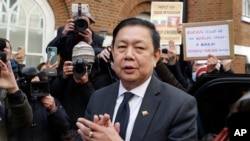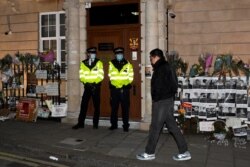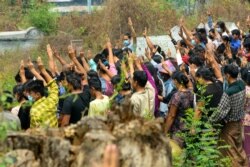Myanmar’s ambassador to Britain has been locked out of his London office over his support for deposed leader Aung San Suu Kyi.
Kyaw Zwar Minn told reporters he was barred from entering the embassy Wednesday under orders from Myanmar’s military junta.
In a statement read on his behalf Thursday in front of the building, Kyaw Zwar Minn said that embassy personnel were being “threatened with severe punishment” if they refused to work for diplomats loyal to the military government.
British Foreign Secretary Dominic Raab, in a tweet Thursday, condemned the “bullying actions of the Myanmar military regime,” while paying tribute to Kyaw Zwar Minn for his courage.
The development comes a day after Myanmar security forces killed at least 11 civilians and wounded at least 10 others when they fired on government protesters in the northwestern town of Kalay, according to reports received by VOA’s Burmese service.
One protest organizer told the service that troops tasked with removing barricades set up by the demonstrators opened fire indiscriminately. The protesters are demanding that Suu Kyi's civilian government be returned to power.
The organizer said an undetermined number of protesters, some armed with homemade weapons, were arrested in the town known for fiercely resisting government forces.
Video of the pre-dawn attack included the sounds of gunfire and grenade explosions. Social media posts said rocket-propelled grenades were fired.
A young man who lives in Kalay and escaped arrest told VOA the security forces fired at least 20 rocket-propelled grenades to destroy the barricades and fired bullets at the protesters.
Protesters in Kalay, who previously armed themselves with homemade hunting rifles and had established neighborhood strongholds, inflicted casualties on security forces during an earlier assault on the town and nearby villages on March 28, according to the Myanmar Now news service.
The demonstrators, who have organized what they call the “Kalay Civil Army,” inflicted more casualties on junta forces in the following days, the online news site reported.
The March 28 attack occurred one day after government troops killed more than 110 civilians throughout the Southeast Asian country, the highest one-day death toll since the February 1 military coup that ousted the democratically elected government.
Regular anti-government protests continued in other cities and towns Wednesday, including in Bago, northeast of Yangon, where a resident confirmed to VOA that government forces killed two men and injured five others.
One person was killed in a protest crackdown in Monywa, the capital of the Sagaing region, and another was killed in the town of Nyaung Shwe in the southern Shan State, VOA confirmed. At least nine arrests were reported in the southern city of Dawae.
Nearly 600 civilians, including dozens of children, have been killed by government troops and police since the coup, according to the Assistance Association for Political Prisoners. Of the 3,500 people who have been arrested, 2,750 are still detained, AAPP said.
Breaking news 🛑
— MyatPyaeSone (@myatpyae77) April 8, 2021
Myanmar famous model and actor Paing Takhon was arrested at 5:00 AM local time in North Dagon. He is in bad health condition as evident by his latest social media. #WhatsHappeningInMyanmar #Apr8Coup pic.twitter.com/2S2STpmVf1
The National League for Democracy, led by Suu Kyi, had governed Myanmar since its first open democratic election in 2015, but the military contested last November's election results, claiming widespread electoral fraud, largely without evidence.
Suu Kyi and President Win Myint were detained in the coup. Martial law has been imposed in townships across Myanmar.
On April 1, the U.N. Security Council repeated its call for the immediate release of all detainees in Myanmar, including Suu Kyi and Win Myint, and an end to violence.
In a statement, the council expressed its deep concern for the “rapidly deteriorating situation” in Myanmar and strongly condemned the use of lethal force by security forces and police against peaceful pro-democracy protesters and the deaths of hundreds of civilians, including women and children.
The council also called on the military “to exercise utmost restraint” and on all sides “to refrain from violence.”
The Security Council reiterated the need for full respect for human rights and the pursuit of “dialogue and reconciliation in accordance with the will and interests of the people of Myanmar.”







